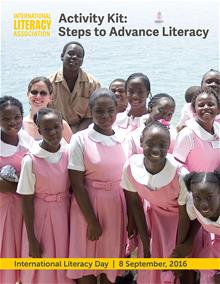 Tomorrow marks International Literacy Day (ILD), and this year, as always, emphasis is placed on worldwide literacy needs. This year is special to me, as the International Literacy Association (ILA) has put the focus on the land I love—my home, Jamaica.
Tomorrow marks International Literacy Day (ILD), and this year, as always, emphasis is placed on worldwide literacy needs. This year is special to me, as the International Literacy Association (ILA) has put the focus on the land I love—my home, Jamaica.
This year I am away from my island, working on another—England, specifically, London—as a literacy educator. This year, as other educators around the world will do, I will share insight into Jamaican culture with my students through ILA’s ILD Activity Kit, filled with Jamaica-centric activities for every age level. As my country is popularly known for music, dance, sports, and food, the increasing emphasis placed on nationwide literacy is a point of pride—it is the passport to the world. While I am away in London, reading this kit is like reading a letter from home.
On ILD, we raise awareness for the development of education as a nation through reading sessions, reading fairs, concerts, and various activities from the specially designed activity kit promoting literacy at numerous levels for various age groups. Activities and materials encompassing the Jamaican culture, history, and geography will be used for literacy engagements worldwide. What a privilege it is to share that part of us that will also promote education.
Being the spotlight country, for us, means the world will be exposed to our life and culture along with our work in education and literacy in particular.
ILA was inspired by our students’ dedication to literacy and learning. The theme for this year, “Steps to Advance Literacy,” focuses on our nation—a small island where big things happen—and the length our children go to learn.
Let us continue to promote our development in literacy education—I implore policymakers, educators, and parents around the world to use ILD 2016 to promote greater literacy developments in Jamaica by promoting reading at all levels.
Progress in Jamaican literacy development is continuous. I celebrate the Jamaica Reading Association and other literacy organizations, facilities, and advocates. We are well represented in the advocacy realm, including the flood of our national colors of black, green and gold at the ILA 2016 Conference & Exhibits in July.
On this day, ILA celebrates literacy in Jamaica and around the world in addition to the steps we still need to make to eradicate illiteracy. Today, I celebrate the growth of literacy in my home.
Jamaica, I love you.
 Marique Daugherty is a native of Kingston, Jamaica, and is currently teaching English Language and Literature in London. She holds a master’s degree in Literacy Studies from the University of the West Indies and has created and led literacy programs and institutes in Jamaica. She is currently a current Royal Commonwealth Society Fellow.
Marique Daugherty is a native of Kingston, Jamaica, and is currently teaching English Language and Literature in London. She holds a master’s degree in Literacy Studies from the University of the West Indies and has created and led literacy programs and institutes in Jamaica. She is currently a current Royal Commonwealth Society Fellow.